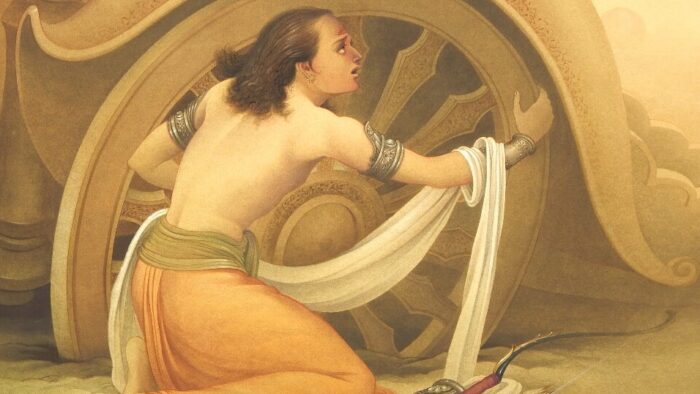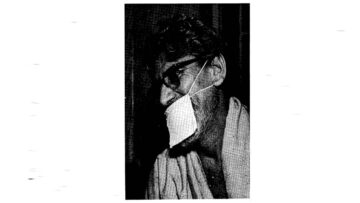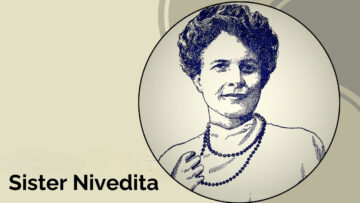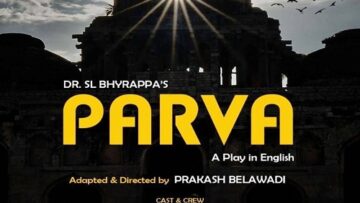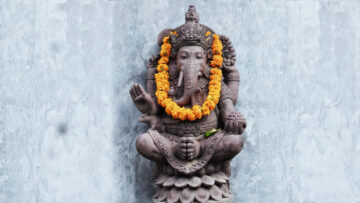In the first part of the article, we saw Karna’s physical drift through the river and the beginning of his destabilization at Hastinapura. The destabilization reaches a concrete stage with Karna reaching the ‘Demonstration Arena’ where he is elevated as the King of Anga by Duryodhana. So far, his displacement was transactional and adhoc in all his support to Duryodhana. Karna retained his freedom to withdraw himself to a more stable position. However, with this elevation, his displacement becomes permanent. In his new position, the drift becomes an eternal destabilization, of constant agitation.
The next act of Karna is described in the Shanti Parva, not any earlier. This is the best kept secret of Karna. In the Mahabharata, only Karna himself and Sage Narada are privy to this knowledge. Aware of his limitations, Karna seeks Brahmastra from Acharya Drona in order to be an equal to Arjuna. The great Acharya has blessed Arjuna with Brahmashiras. In a moment of emotional loyalty, Karna has promised Duryodhana to be the balancing factor against Arjuna in his conflict against the Pandavas. Aware of the intention and purpose, Drona refuses to present him with the Brahmastra, as Karna’s purpose is very clear. A Brahmcharya filled Brahmana or a Tapas filled Kshatriya can alone seek it – Drona says. Karna was neither a Brahmana nor filled with Tapas.
Nevertheless, Karna is determined and persevering, a quality without Tapas is dangerous. He approaches Parashurama as a brahmana disciple, serves him faithfully and finally learns many divine Astras. Thanks to Parashurma, Karna enjoys the proximity of all Divine beings as well. Yet, Karna cannot escape the dynamic of destabilization he has suffered. One fine day, while practising on the banks of the ocean he accidentally kills a cow belonging to a Brahmana. The distraught dvija curses him an equivalent fate in his final duel with his main opponent – his wheel caught in the earth. With fallen arms and bent head, Karna returns to the Ashram. In due course of time, Parashurama teaches him the Divine Brahmastra.
The dynamic continues to play. One day, Parashurama seeks to rest on the lap of his disciple. The proverbial destiny strikes in the form of a worm. Not wanting to disturb a sleeping Parashurama, Karna chooses to suffer the deep sting of the worm. But the chill of the blood wakes up Parashurama. The worm and its sting was ferocious. Parashurama’s gaze transformed the worm. At once it died, and in its place appeared a Rakshasa who thanked Parashurama and left for his abode. The rest is well known. From the extent of the blood blow, Parashurama realizes that the man is not a Brahmana. “Your dare is equal to that of a Kshatriya, Karna. A Brahmana cannot suffer the pain of such a ferocious worm. Who are you?” thundered Parashurama. Helplessly, Karna reveals his true identity of being a Suta. He falls at his feet, his body embracing the ground. Parashurama curses him for being untruthful (not because he was a Suta who did not deserve Brahmastra). The Brahmastra would be inaccessible to him when he came face to face with an equal. He would suffer the loss of memory. “Only a Brahmana can possess the Brahmastra forever with his Brahma Tejas. A liar like you cannot have a place in my Ashram. At the same time, your learning at my feet shall not go waste. None will be able to equal you on the battlefield,” blessed Parashurama. Thus, Matsarya had led to Kama and in turn Lobha, earning him curses. Karna returned back to Hastinapura with the (artha) security of Brahmastra and (anartha) insecurity of the double-curse. Karna was to tread this slippery territory forever.
Duryodhana soon extracts the price for elevating Karna.The King of Kalinga organizes a Swayamvara for his daughter and invites Kshatriyas of the times. Duryodhana, with Karna and others, make their presence. The Princess, being introduced to each King along with their achievements, passes through Duryodhana without choosing him. Duryodhana considers this an insult to his pride and decides to abduct the Princess. Duryodhana’s confidence stemmed from the eternal protection of Bhishma and Drona, as well the physical protection from Karna right in the Swayamvara. Karna does not disappoint him. He defeats all the Kshatriyas through his valour and carries away the Princess to Hastinapura. This is probably Bhanumathi, although the texts do not give away the name explicitly. This insensitivity towards women was to lead Karna further downhill in the path of Adharma very soon.
However, Duryodhana’s overindulgence at Kalinga had a background. That is Draupadi Swayamvara and the humiliating defeat both meet at the hands of Arjuna and Bheema. Most of the Mahabharata recensions present Karna as striking at the Matsya Yantra and failing. However, few present Karna as being stopped just before his attempt. Nevertheless, the Suta Karna was very much invited to the contest and his candidature was accepted by the Drupada, Dhrushtadyumna and the entire Panchala Sabha. In all recensions, Karna is introduced, invited and picks the bow for a strike. Hence, his being a Suta until at that stage was never a consideration. [This fact is corroborated later too in the Yudhisthira-Drupada conversation. Drupada seeks to know the Varna of the Pandavas, not recognized yet then. Yudhisthira responds “When the contest was open to all – how does that matter now?”]. In a few recensions, Draupadi stops Karna and announces her reluctance to marry a Suta. This is a grouse that Karna nurses forever (in those recensions) and adds to his sense of destabilization. It is compounded by the fact that he is comprehensively defeated by Arjuna because of his Brahmastra. The Pandavas marry Yagnaseni.
At Hastinapura, the Kauravas mull over the next steps. Are we to hand them over half the Kingdom? Are we to deny through treachery? Are we to wage a war seeking comprehensive victory? Karna categorically rejects the first two and urges Duryodhana to choose war. Karna’s need for a duel with Arjuna was of that intensity. It became Karna’s second nature. A comprehensive defeat a few weeks back did not open his eyes. Karna’s seeking of equality with Arjuna blurred his otherwise sharp intellect to see the obvious reality. In spite of loyalty to Duryodhana, Dronacharya not only sees what is Dharma but also recognizes the reality that Pandavas were invincible. Karna fails to see in broad daylight what was obvious in a night’s darkness. At this stage, the roles get reversed. So far, Duryodhana seemed to use Karna for his purposes. Now, Karna’s personal need blocks Duryodhana from appreciating the strength of Pandavas. Karna forever becomes the reason for Duryodhana not seeking a rapprochement with the Pandavas, under the false confidence of being able to defeat Pandavas through Karna. Nakula makes this point very clearly in the battlefield and accuses Karna of deepening the rift between the Kauravas and the Pandavas. Beyond this, there is a divine angle to this too. In the Shanti Parva, Narada narrates an important purpose behind Karna’s birth. Kshatriyas seek the means of reaching heavens along with their weapons from the Devas. The latter respond that an immense conflict among them leading to annihilation alone can take them to the heavens along with their weapons. In order to help them, Devas place Karna in the womb of Kunti for this purpose. Thus, the Kshatra Kula is a tightly held community and deviation from the order always destabilizes and creates conflicts in the Kshatriya Kula.
It is in the Sabha Parva that Karna loses all his elements or comes into his true elements. Vikarna, Duryodhana’s brother, stands for Draupadi’s cause seeking responses to her piercing questions. He declares that Draupadi was not to be treated as Duryodhana’s Dasi as the Dyuta was performed in an Adharmic manner. Among the Dustha-Chatushtya, Karna takes the lead in being outraged. Among other things, he humiliates Draupadi as an object to be enjoyed – Bhogyavastu and one who has five husbands against the custom of the society, hence Bandhaki. There was no wrong in disrobing Draupadi, declares Karna. He immediately turns to Dushyasana and presses him to disrobe Draupadi. Dushyasana obeys. At that moment, Kauravas forget that the shadow of Srikrishna is sheltering the Pandavas forever. Srikrishna protects Draupadi. Pandavas leave for the forest. Duryodhana is still jittery. What if they return after 13 years? The conflict-ready Karna is ever ready with a proposition. “Let us go to Kamyaka and kill the Pandavas right away” boasts Karna. Duryodhana is pleased but Vyasa learns of their designs through divine means and stops them before the thought could transform into action readiness.
Karna gets tested to his fullest in two situations thereafter. First, in the Ghoshayatra Parva, where the Kauravas go into the Forest on the pretext of a march. The second, in the Virata Parva, when they drive away Virata’s cow and attack Arjuna in the guise of Brihannala. Both Karna and Shakuni together conceive the idea to go to Dvaita-Vana to humiliate the Pandavas. It is Karna who conceives the specific pretext – to visit the Cows in the Dvaita-Vana and march on the way to establish the authority of Duryodhana. Karna leads the discussions with Dhritarashtra to obtain a go-ahead from Dhritarashtra. The Kauravas march into the Dvaita Vana but end up in an unexpected conflict with Chitra-Sena, the Gandharva. Karna is comprehensively defeated by Chitraratha. He runs away from the battlefield in Vikarna’s chariot to save his life. Duryodhana is left to the mercy of Chitraratha. He is further humiliated by getting rescued by his bete-noire Bhimasena. A hurt Duryodhana is on the verge of giving up his life. The Daityas take him to the Rasatala, offering their services in a future war and bestowing him with many powers. Finally, Karna convinces him to go back to Hastinapura. Brushing aside Bheeshma’s advice to make preparations to return the Kingdom, Karna goes on an expedition to acquire more Kingdoms and perform Vaishnava Yaga to secure Duryodhana’s powers. At the end of this, Karna takes a vow to eliminate Arjuna. Thus, the Dvaitavana episode nullifies any possibility of a reconciliation between the Kauravas and the Pandavas. Karna not only plays a major role but becomes the very reason for this irreconcilability. At the Gograhana war in the Virata Parva, it becomes clear that in pure warfare, Arjuna still remained superior. Parashurama’s blessing protects Karna from everybody except Arjuna. Arjuna defeats Karna twice. His arrows pierce Karna’s divine armour, hurting him deep in the chest and falling him in dizzy. Karna flees from the battle field.
However, a little before the Gograhana war, is when Karna faces a defining moment. His Karma meets his destiny. The fluid nature of Karma creates a conflict and confusion even in the divinity. Realizing that the war was inevitable, Bhagavan Surya appears as a Brahmana in Karna’s dream and implores upon him to not part with his divine armour at any cost. Indradeva himself was to appear as a Brahmana and seek the Kavacha – the divine armour from the Dana-Shoora Karna. Karna wonders who the Brahmana was. Suryadeva reveals his identity but does not reveal the divine relation and reason. Nevertheless, Karna is pleased that his Ishtadevata was right in front of him but refuses to move away from his vow of not refusing anything to a seeking Brahmana. Surdeva convinces him to at least seek Vasavee Shaktyayudha if he is parting with his armour. Karna forgets the episode and when Indra indeed comes does not recognize him at once. Indra refuses to accept anything except the Kavacha. Karna then realizes who he is and finally barters his Kavacha with Vasavee Shaktyayudha. The loss of his armour definitely weakens him but he is left with that one definite Astra to neutralize Arjuna. Indra warns him that it would return to Indra after one use and it would be ineffective against Arjuna as he is protected by none other than Srikrishna. The enormity of Indradeva’s warning unfortunately is completely lost on Karna. With this loss, a final slide to destruction begins.
Karna’s time at the Parashurama’s Ashram has two trajectories. On the one hand, Karna is acquiring new weapons and knowledge. However, the ground on which he is standing is very slippery with Asatya. His declaring that he is a Brahmana helps him to acquire abilities but cannot sustain them. His accidentally killing the Cow of a Brahmana signifies this unsustainability. His discipline has not equipped him with enough restraint. His indulgence always gets the better of his wisdom – which is the result of the destabilization of his Svadharma. His acquiring of new weapons only results in greater indulgence. The Cow is the most easily distinguished among all animals. The consciousness to recognize a cow is the most ingrained in the civilization. The loss of this sensitivity signifies greatest internal destabilization. It ought to be repaid with a similar consequence. Karna has to meet a similar end at his most sensitive and vulnerable time, hence the curse. This is a case of indulgence without sensitivity. There is an eerie similarity with what happens to Pandu (and Dasharatha in Ramayana).
The episode of Parashurama’s curse reveals Karna’s mental drift and lack of stability. He fails to realize that the enormity of withstanding such an enormous physical pain would not be lost on Parashurama. By claiming to be a Brahmana, destiny may have opened the path of a Brahmana to Karna. With absolute surrender to Parashurama, Karna may have transformed himself into a Brahmana like Veetahavya – his Panchala ancestor. However, Karna does not embrace the path. He does not acquire the characteristics of a Brahmana. At the same time, Parashurama’s absolute words that “Your dare is equal to that of a Kshatriya” does not make Karna dwell deep into himself and his Svadharma. This did not push him into exploring his Kshatriya roots. Thus, Karna fails to pursue any single path with absolute commitment and devotion. In pursuit of power, he has already abandoned his primary Suta roots. Just as he failed earlier to pursue the paths of Kshatriya or a Suta completely, he fails the Brahmana path as well. This is a consequence of his drift – he has crystallized his rivalry and equality with Arjuna as his most important identity. Instead of devoting himself to a path to achieve the Purusharthas, Karna is fixated upon a specific destination. Hence, his path is not defined by the balance of the Purusharthas. Throughout, the integrity of the path chosen never bothers Karna.
Being fixated upon his rivalry with Arjuna has its own unique set of problems. On the one hand, it creates a desperation to keep Duryodhana close at all times and at all costs. Hence, his active support to abducting Bhanumathi. On the other hand, it actively seeks a conflict between the Kauravas and Pandavas. Karna constantly pushes Duryodhana towards it, which is explicitly stated by Nakula towards the end. The pinnacle of this is Karna in the Sabha Parva. The mere loss of the Kingdom may not have pushed the Pandavas as much for a total annihilation. Karna stops the wisdom of Vikarna reaching Duryodhana, vehemently defends pawning Draupadi and finally actively calls for Draupadi to be humiliated. It is to be nobody other than Karna seeks this pathetic act. The Adharma of it is lost on nobody except the Dushta Chatushtaya, but it is conceived in the mind of Karna, as a consequence of seeking equality and rivalry with Arjuna. Thus Karna becomes the very reason for the Mahabharata war.
The third consequence of this rivalry is Karna fails to recognize repeated defeats and humiliations. Parashurama’s blessing of invincibility in the battle field serves Karna at all times except in his duels with Arjuna. He is comprehensively defeated and routed all the time. Neither does it work against divine beings like Gandharva Chitraratha. Karna and Duryodhana are so actively feeding each other that neither of them recognizes this simple reality. Bheeshma actively chides Karna multiple times on his boasting but Karna cannot see this obvious reality. Thus the rivalry results in the loss of perspective, continuous indulgence in Adharmic acts and a destabilized state of mind where what is acquired is lost in the absence of adequate readiness.
But his indulgences are so strong that he ends up causing a conflict in the divinity too. Divinity comes to him seeking his protection, but Karna’s mind is not ready to submit himself to Divinity. This is much in contrast to Arjuna where he actively seeks Divinity. His acquiring of Divine weapons signifies that. Karna on the contrary chooses to abandon what came to him by birth, in order to pursue a self built image. Not that the Kavacha would have protected him, for Arjuna had invaded it a couple of times. However, not having the Kavacha weakens Karna. A divine protection is lost just to pursue an ego-filled image. An over confidence on the self and false security of a destructive weapon misleads Karna.
Thus, Karna’s journey becomes one filled with contradiction, lack of devotion to established Paths, inability to see the obvious reality, single minded pursuit of rivalry as the identity and self above Divinity. Thus, Karna became an embodiment of Adharma.
Read part one here.
(Image credit: Rajib Gain, Mojarto)
Disclaimer: The opinions expressed in this article belong to the author. Indic Today is neither responsible nor liable for the accuracy, completeness, suitability, or validity of any information in the article.

